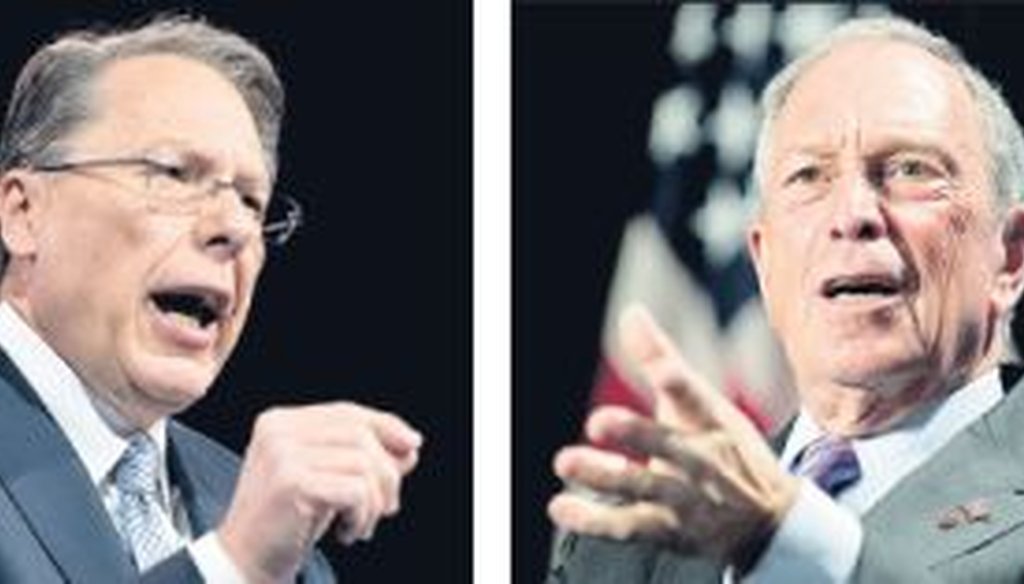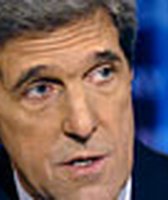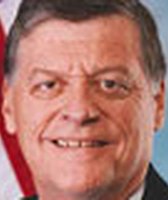Get PolitiFact in your inbox.

Wayne LaPierre, left, of the National Rifle Association; right, New York City Mayor Michael Bloomberg of Mayors Against Illegal Guns
It’s a statistic that President Barack Obama and gun control advocates like to repeat again and again: Forty percent of gun purchases are made without background checks.
It’s true that purchases at gun shows and via the Internet typically go without background checks. But is it 40 percent? It’s difficult for us fact-checkers to say, because it’s based on a telephone survey from 1994 — almost 20 years ago.
That’s about the time federally sponsored research on guns and gun violence virtually ground to a halt.
The stoppage was intentional — and political. The National Rifle Association successfully lobbied members of Congress to cut the budget for the Centers for Disease Control and Prevention and to pass amendments discouraging gun research.
For years now, congressional directives have stated that money for research may not be used "to advocate or promote control." Researchers are warned that no money may go to activity designed to affect the passage of legislation that restricts or controls firearms.
The NRA has proudly claimed credit for these moves, saying that federally funded research was biased against gun ownership.
"The problem that I see with what the CDC is doing is that they are not doing medicine, they’re doing politics. And they shouldn’t be doing politics," NRA executive vice president Wayne LaPierre said in 1995.
For years, the CDC has given the NRA a courtesy "heads up" any time it publishes studies related to firearms.
The dwindling federal research complicates efforts to fact-check claims about gun statistics. PolitiFact rated the 40 percent gun statistic Half True, after one of the original study’s co-authors told us he had "no idea" if the "very old number" was still a good estimate.
Since the federal government was elbowed out of the gun-research business, nonprofits that advocate against gun violence are now the main funders. This means that much of today’s research is being funded by groups that have staked out clear positions on gun policy.
For instance, New York City Mayor Michael Bloomberg, one of the nation’s leading voices for gun control, has given so much to Johns Hopkins University that it named the public health school in his honor. Johns Hopkins and a host of other universities that study gun policy have received funding from the Joyce Foundation, a Chicago-based philanthropic group concerned about the toll of gun violence.
In the wake of the shootings of elementary school students in Newtown, Conn., Obama ordered federal agencies to restart funding on gun research, noting that basic research should be neutral, neither favoring or opposing specific policies. After Obama directed that research resume, the CDC issued a contract to the Institute of Medicine of the National Academy of Sciences — a widely respected scientific forum — to identify research priorities for studying firearm-related violence.
The institute held its first hearing Tuesday, attracting both academic researchers and the NRA. In other words, research on guns — whether funded by government or private groups — seems to be on the verge of a comeback. But the return of federally sponsored research comes at a time when the sponsors of gun research have strong views about gun control, raising questions about whether the findings are — or seem to be — influenced by policy positions.
• • •
At the Institute of Medicine meeting, John Frazer, director of the NRA’s legislative research and information division, told the group it needs to ensure that new research is "balanced."
"We should study the benefits as well as the costs of gun ownership, and the costs as well as benefits of any proposed restrictions," he told PolitiFact.
Other gun-research heavyweights from around the country attended, including researchers from the Johns Hopkins Bloomberg School of Public Health, the Harvard University School of Public Health, the University of Chicago Crime Lab, the University of California at Davis Violence Prevention Research Program and the Firearm & Injury Center at the University of Pennsylvania.
Those institutions have something in common: They’ve received grant money over the years from the Joyce Foundation, which also funds advocacy for gun control policies, including the Violence Policy Center and Bloomberg’s Mayors Against Illegal Guns. Obama served on the board from 1994 until 2002, before he ran for the U.S. Senate in 2004.
The Joyce Foundation has spent more than $53 million over 15 years on advocacy and research for gun violence prevention, according to data we compiled from its annual reports.
To put that in context, it’s more per year on average than the CDC spent on "firearm injury prevention activities" in the early ’90s, before the congressional clampdown. Not to suggest that it’s a lot of money in the research world, indeed, the opposite: "That’s the joke — they were hardly doing anything to begin with," said David Hemenway of the Harvard Injury Control Research Center.
Still, the foundation’s contributions grew as federal funding fell away. It invested millions in jump-starting a state-based National Violent Death Reporting System that’s now part of the CDC.
After the Newtown shootings, Joyce Foundation president Ellen Alberding penned an op-ed for the Chronicle of Philanthropy, arguing for stronger gun laws.
"It’s time for everyone in philanthropy to do what’s right and participate in a solution," she wrote.
She called for strengthening the background check system, requiring universal background checks for gun purchases and banning military-style assault weapons and high-capacity magazines — all part of the president’s plan.
Hemenway at Harvard said the foundation didn’t seek to influence their work.
"They just wanted us to do good firearms research," he said.
• • •
How should fact-checkers approach research paid for by groups with a stake in the fight? Traditionally, we’ve been skeptical of polls and research sponsored by such groups. But in today’s gun-research environment, it’s not easy to tell how much influence a funder has on the final results.
This became an important issue for us recently when we looked at Obama’s claim that a "wide majority of NRA households" supported legislation on gun background checks.
One of the surveys we found was published in the prestigious New England Journal of Medicine and conducted by researchers from the Johns Hopkins Bloomberg School of Public Health and its Center for Gun Policy and Research.
Bloomberg’s relationship with Johns Hopkins has made him "the most generous living donor to any education institution in the United States," according to the New York Times. The particular study we were looking at was released in conjunction with a Summit on Reducing Gun Violence in America, at which Bloomberg offered opening remarks.
Given Bloomberg’s close affiliation with the school, we wondered whether the Johns Hopkins study should be treated more like an independent media survey, or more like the one sponsored by an advocacy group?
The answer, it turned out, is anything but clear cut.
Daniel W. Webster, who directs the Johns Hopkins Center for Gun Policy and Research, told us the study was not influenced by Bloomberg’s support for the public health school.
"The scientific research that we do at the Johns Hopkins Center for Gun Policy and Research is not dictated, controlled or biased by any funding source," he said.
We also asked a range of experts in scientific ethics about their thoughts on the matter. Some expressed little concern, while others saw red flags.
Jonathan Moreno, a professor of medical ethics and health policy at the University of Pennsylvania, was among several experts who said the relationship with Bloomberg should be acceptable as long as certain protections are in place.
"As long as the research is peer-reviewed and sponsored at arms length, including without influencing the questions asked or the way the questions are framed, I’d be happy for any institution — including the NRA — to sponsor any research on gun safety," Moreno said.
Some experts also drew a distinction between money given directly to a researcher (which is typically disclosed in published papers) and that given to the author’s institution (which is not necessarily disclosed).
"Money going to a university generally introduces little or no bias into the performance and findings of scientists," said Kenneth D. Pimple, an ethics researcher at Indiana University. "Money given directly to a researcher might be a different matter."
Others are not convinced. Gary Kleck, a Florida State University criminologist who has studied gun policy, said it’s "naive to think that information generated by employees of an academic program endowed by the nation’s most powerful, or second most powerful, advocate of strict gun control will be received with the same trust as information from other sources."
• • •
Others say a complicating factor is that research funded by a vested interest can still be good science.
"If I’m funded by the pecan industry and publish a paper that says pecans are good for you, it doesn’t necessarily mean the study is bad science," said Arthur Caplan, a bioethicist at New York University’s Langone Medical Center.
Jay Corzine, a sociologist with the University of Central Florida who has done gun-related research, said that in his experience, sponsorship does not necessarily mean meddling. If anything, he suggested, it’s the exception to the rule. Corzine recalled never having been pushed to certain conclusions back in the 1980s when he was doing research on drunk driving funded by the Distilled Spirits Council of the United States.
Having a sponsor with a stake in the fight "opens the door for criticism that may or may not be justified, but it doesn’t mean the research will be biased," Corzine said.
That’s why it’s important to have both strong disclosure and a diversity of research projects being undertaken. Yet in recent years, gun-related research has been hampered by the federal ban, and disclosure systems have been imperfect.
For instance, conflict-of-interest forms tend to focus on direct financial conflicts for the researcher, not on the institution, or potential political gain.
In the case of the New England Journal of Medicine paper, the journal’s mandatory conflict-of-interest disclosure form for the paper did not make any reference to Bloomberg (though the researchers’ affiliation with the Bloomberg School was mentioned in their biographical writeup). "We ask authors to disclose their personal conflicts, not the associations/affiliations of their organizations," Jennifer Zeis, a spokeswoman for the journal, told PolitiFact.
Complicating matters further, Caplan said, is that one of the most valuable ethical backstops in scientific research — peer review — is not always robust enough to uncover biases, especially when they are well hidden.
Ultimately, not even the most rigorous vetting will satisfy everyone.
"On some issues, including tobacco use and firearms, it’s probably a safe bet that to some people there will be an appearance of a conflict of interest in any research that challenges their stance," Pimple said. "People who are on one side of the issue will see all findings that go against their stance as biased."
Our Sources
See original stories




















































